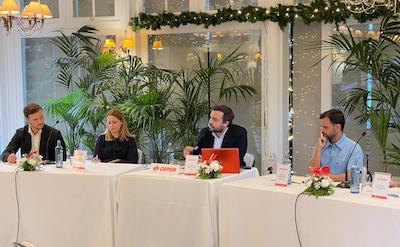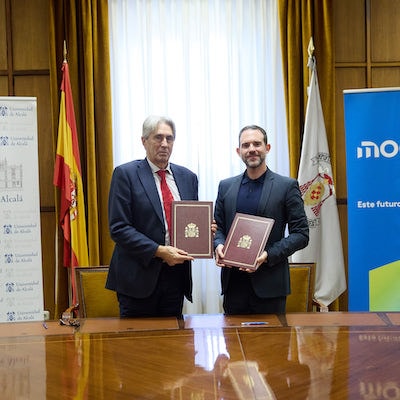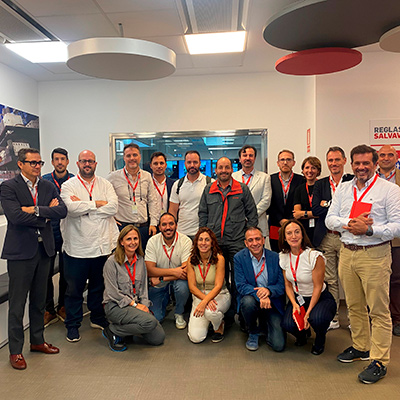- The energy company contributes its experience in this field, which has led to the implementation of a digital university, Cepsa Digital Experience, which has already been attended by more than 1,200 company professionals.
- The cycle advocates for a close working relationship and exchanging best practices between Cepsa and the Canary Islands society.
The key role played by people in the digital transformation was the topic addressed in the fourth session of the 'Cepsa Dialogues in Action' cycle, promoted by the Cepsa-Santa Cruz Liaison Committee. A meeting that is shaping up to be a forum for debate to bring and exchange knowledge and Cepsa's best practices with the Canary Islands community.
Under the title 'Revolution 5.0: people, the heart of digital transformation', the opening speech was given by Arturo López-Brea, head of Digital Capabilities and Change Management in Digital Transformation at Cepsa. Subsequently, a dialogue began that featured the director of People and Talent of Cajasiete, Daniela Postiglione; the technician of R&D&I and Transfer projects of the General Foundation of the University of La Laguna, Carlos Velázquez; the Digital Transformation technical coordinator of Tenerife Isla Solidaria of Sinpromi, Cristina Hernández, and the CEO and co-founder of Hunger4Innovation, Fernando Lecuona.
During his talk, the speaker, Arturo López-Brea noted that digital transformation is an accelerator of the energy transition in which people are a key springboard. So, he added, "we must empower and digitally train our professionals so that they can carry out this fifth revolution."
He insisted that "the digital transformation is an aspect that concerns not only technical profiles, but also people must use learning as a tool to reinvent themselves, improve their work, and provide a better service to society." In this regard, he stressed that it is necessary to democratize access to knowledge to all employees, thereby developing their digital capabilities and accelerating and strengthening the digital transformation.
He also argued that the digital transformation must reach people out of desire, promoting a culture of interest in participating and leveraging knowledge, developing the capabilities and skills to carry it out.
López-Brea referred to the dynamics followed at Cepsa, which is committed to bringing people closer to the digital transformation with webinars, talks, and training given through the company's digital university, Cepsa Digital Experience (CDX), which has already been attended by more than 1,200 people from the company and has reached 100,000 hours of training with the idea that Cepsa's professionals accelerate and carry out the company's digital transformation.
He specified that artificial intelligence, data, technology, process automation, as well as agility and change management are the topics developed by CDX, the latter being the one that has generated the most interest.
He explained that this digital university becomes an experiential element, through a methodology that includes a knowledge phase with online sessions, participation in a real digital transformation initiative with guidance from a coach and the commitment to solve a real challenge in the area with the knowledge acquired.
A necessary advance
During the discussion, the participants in the roundtable agreed on the importance of advancing in the digital transformation for the opportunities and benefits it brings, while stressing that it is a train that must be boarded to survive, which means eliminating the fear of this revolution.
They also stressed that digital transformation plays a key role in empowering people and shared their experience in this area. In this sense, Cristina Hernández referred to the commitment made by Tenerife Isla Solidaria for volunteering to meet the demands of the population through a digital tool developed together with ITER, an organization with which they are also working in a process of digital transformation of the associative fabric. He also advocated for searching for partnerships in the region and other social agents.
For her part, Daniela Postiglione spoke about the financial sector's commitment to the digital transformation and alluded to the work being done to be at the customer's side through training and support, especially for groups such as the elderly. He also stressed the importance of proper change management.
Carlos Velázquez highlighted motivation as a key element for training and insisted on the need to involve people in the change, bearing in mind that both technology and R&D will be key components in addressing the problems that arise. This is a task that, he pointed out, they promote by providing advice to SMEs.
For his part, Fernando Lecuona explained that, when addressing digital transformation, it is important to have a space that connects different innovation agents, and he was committed to maintaining values as a priority element. Along these lines, he defended his commitment to implementing programs with companies to connect talent with experience.
Those interested in accessing the recording of the three Dialogs in Action sessions held to date can do so on Cepsa's official YouTube channel.




